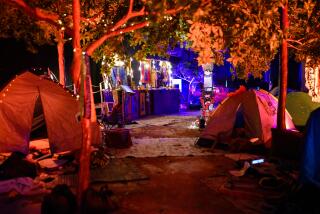Art-Loving Israelis Don’t Condemn Envoy’s Vandalism
JERUSALEM — The diplomat admitted he might have been less than diplomatic.
The artist spoke passionately of artistic freedom. The critics were critical -- but spoke of larger principles at stake.
And Israelis watched in fascination, chiming in with an opinion. Or two. Or three.
The issue: Was Israel’s envoy to Sweden in the wrong when he vandalized a work of art that some said appeared to glorify a suicide bombing?
On Sunday, the opinion in Israel -- at least that of its ruling echelon, from Prime Minister Ariel Sharon on down -- appeared to be a resounding no.
Even among an art-loving Israeli public, the scars of more than 100 suicide bombings during the 3 1/2-year-old Palestinian uprising left few in total sympathy with the artist.
Both the prime minister and Foreign Minister Silvan Shalom, the immediate boss of the ambassador to Stockholm, Zvi Mazel, expressed support Sunday for the envoy, who flew into a fit of fury upon viewing the artwork. It featured a pool of blood-red fluid upon which floated a portrait of the woman who blew herself up in a crowded restaurant in the Israeli port city of Haifa on Oct. 4, killing 21 people.
Mazel, as shown on a videotape, ripped out the electrical plugs for the spotlights over the exhibit -- titled “Snow White and the Madness of Truth” -- and flung at least one of the lights into the crimson pool.
The envoy then exchanged harsh words in Hebrew with the Israeli-born artist, Dror Feiler -- a former paratrooper in the Israel Defense Forces -- shouting that the work was “praise of a suicide attack and the whole institution of suicide.”
“After the first Holocaust, you are starting a second Holocaust,” the ambassador yelled on the tape. “Shame on you! You are an obvious hater of Israel.”
Since the incident occurred at the start of the Jewish Sabbath, the furor back home in Israel did not come into full bloom until Sunday, the start of the workweek.
The controversy came at a time when Israel feels under siege from what its diplomatic establishment describes as a wave of anti-Semitic attacks across Europe.
The Sharon government is also upset over plans by the International Court of Justice, which sits in The Hague, to hear arguments against Israel’s construction of what the Jewish nation describes as a security fence to keep out suicide bombers. Palestinians denounce the barrier as a land grab, because it cuts deep into the West Bank.
At a Cabinet meeting Sunday, Sharon and his government ministers spoke fervently in support of the veteran Israeli envoy -- even as former Foreign Ministry colleagues quietly acknowledged his reputation as something of a hothead.
The ministry, though, staunchly backed Mazel, with spokesman Navot Barken accusing the exhibit’s Swedish organizers of “absolute insensitivity.”
But some Israeli intellectuals confessed to a degree of unease over the ambassador’s passionate protest.
“The question isn’t whether such conduct is permitted or not, but whether it’s the best way to deal with it,” said Shlomo Avineri, a professor at Hebrew University who was interviewed on Israel Radio.
“Perhaps it would have been better if a private person rather than an ambassador expressed his indignation.”
Some fellow artists sided with Feiler, who mounted the exhibit with his Swedish wife.
“I believe this act [of the ambassador] is jeopardizing the artwork of each and every artist around the world, because anyone will now feel free to react in a similar way to Israeli art he doesn’t like,” said Danny Karavan, an Israeli sculptor.
Feiler likened the ambassador to “a crazed soccer hooligan,” saying his work was meant to be a thought-provoking statement against all violence.
“I think he did Israel a bad disservice,” he said in a statement distributed in Israel. “This is a work of art that can be interpreted in many, many ways.”
The ambassador acknowledged he had acted impetuously.
But when he saw the smiling photograph of the suicide bomber, Hanadi Jaradat, used as a sail on a boat labeled “Snow White” -- a photo also used to promote the exhibition -- his entire body trembled with rage, he told the Israeli newspaper Yediot Aharonot.
“This terrorist’s face was supposed to attract an audience,” he told the newspaper.
The mass-circulation daily Maariv interviewed several families left bereaved by the Haifa bombing, several of whom said they wished the artist a similar fate.
“Maybe if he had been sitting in that restaurant, and his wife had been killed, he might have changed his mind,” said Tova Bahat, who was widowed in the attack, and her 3-year-old son critically hurt.
The artist’s mother, too, weighed in.
“Only people who don’t know him can’t understand this -- people who don’t know what he’s been through in life,” she told Israel Radio.
“And those who don’t know how sensitive he is.”
More to Read
Sign up for Essential California
The most important California stories and recommendations in your inbox every morning.
You may occasionally receive promotional content from the Los Angeles Times.









